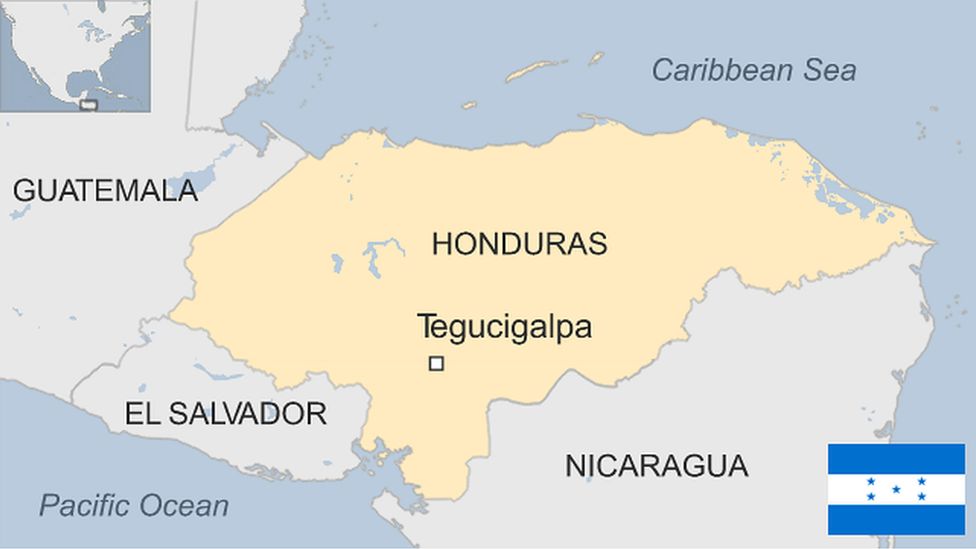Honduras country profile
- Published

Honduras has a long history of military rule, corruption, poverty and crime which have left it one of the least developed and most unstable countries in Central America.
Until the mid-1980s, Honduras was dominated by the military, which supported US efforts to stem revolutionary movements in the region. Since then, civilian leaders have sought to curb the power of the military, with varying degrees of success.
Thousands of Hondurans leave to go to the US each year and the remittances they send home are a crucial source of income for many families.
- Read more country profiles - Profiles by BBC Monitoring
REPUBLIC OF HONDURAS: FACTS
- Capital: Tegucigalpa
- Area: 112,492 sq km
- Population: 9.4 million
- Language: Spanish
- Life expectancy: 69 years (men) 74 years (women)
LEADER
President: Xiomara Castro
Left-wing candidate Xiomara Castro won the November 2021 election on a platform of social justice and transparency.
She promised to tackle powerful drug trafficking gangs, and liberalise strict abortion laws.
Ms Castro's husband, Manuel Zelaya, was president from 2006 to 2009, when he was ousted by a coup. She stood for the presidency on two intervening occasions.
MEDIA
Honduras can be a dangerous country for journalists. Reporters working for opposition media risk threats and physical attack.
Media ownership is highly concentrated and owners of outlets exert editorial influence.
TIMELINE
Some key dates in the history of Honduras:
1502 - Christopher Colombus lands in Honduras, a country originally inhabited by indigenous tribes, most notably the Maya.
1524 - Gil González Dávila becomes first Spaniard to enter Honduras as a conquistador. He is followed by Hernán Cortés, who brings troops down from Mexico. Much of the conquest takes place in the following two decades.
Many regions in the north never fall to the Spanish, notably the Miskito Kingdom. Silver mining is a key factor in the conquest and settlement.
Trujillo on the Atlantic coast is the first capital, followed by Comayagua, and finally at Tegucigalpa in the centre of Honduras.
1600 - When local slave trading stops, African slaves, mostly from Angola, are transported to work in the mines.
The Miskito Kingdom gains support from northern European privateers, pirates and especially the British, who place much of the area under their protection after 1740.
1821 - Honduras declares independence, becomes part of Mexican Empire until 1823, when it joins United Provinces of Central America until federation collapses in 1838.
1838 - Becomes an independent republic.
1859 - Britain withdraws from its informal colony on the Mosquito Coast (named after the Miskito Kingdom) ceding part of it to Honduras and ceding the rest to Nicaragua the following year.
Late 19th Century - Honduras falls under influence of US corporations, which set up huge fruit plantations, granting land and substantial exemptions to them in return for developing the north.
1904 - US writer O Henry coins term "banana republic" in reference to Honduras.
1960 - Northern part of what was the Mosquito Coast is transferred from Nicaragua to Honduras by the International Court of Justice
1963 - President Ramone Morales is deposed in coup. Colonel Osvaldo Lopez Arellano heads first of string of military regimes in power until 1981.
1969 - Week-long so-called "Football War" with El Salvador leads to 4,000 deaths. Border tensions lead to conflict triggered when El Salvador meet Honduras for a three-round football elimination match preliminary to the World Cup. Up to 130,000 Salvadoran illegal immigrants are expelled from Honduras.
1981-82 - First civilian government in over a century elected, but military remains influential.
1980s - Honduras is a stronghold for the US in its proxy war against the pro-Soviet Sandinistas in Nicaragua, training and funding Contra rebels.The Honduran army also fights against Marxist-Leninist militias such as the Cinchoneros Popular Liberation Movement.
1998 - Hurricane Mitch devastates Honduras.
2009 - Several years of a weak but strengthening democracy are curtailed when President Manuel Zelaya is deposed in a military coup and sent into exile.
Related Topics
- Published15 January
- Published10 April 2023
- Published13 February
- Published4 April 2023
- Published31 March 2023